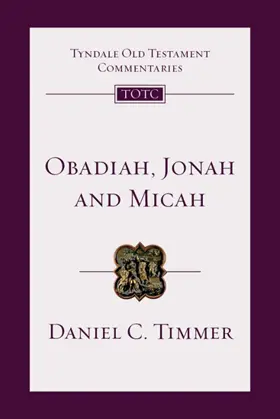

Obadiah, Jonah and Micah
in Tyndale Old Testament Commentaries
Pages
240
Publisher
IVP Academic
Published
5/18/2021
ISBN-13
9780830842742
Obadiah's oracle against Edom. Jonah's mission to the city of Nineveh. Micah's message to Samaria and Jerusalem. These books are short yet surprisingly rich in theological and practical terms. In this Tyndale commentary on these minor but important prophets, Daniel Timmer considers each book's historical setting, genre, structure, and unity. He explores their key themes with an eye to their fulfilment in the New Testament and their significance for today.
The Tyndale Commentaries are designed to help the reader of the Bible understand what the text says and what it means. The Introduction to each book gives a concise but thorough treatment of its authorship, date, original setting, and purpose. Following a structural Analysis, the Commentary takes the book section by section, drawing out its main themes, and also comments on individual verses and problems of interpretation. Additional Notes provide fuller discussion of particular difficulties.
In the new Old Testament volumes, the commentary on each section of the text is structured under three headings: Context, Comment, and Meaning. The goal is to explain the true meaning of the Bible and make its message plain.
The Tyndale Commentaries are designed to help the reader of the Bible understand what the text says and what it means. The Introduction to each book gives a concise but thorough treatment of its authorship, date, original setting, and purpose. Following a structural Analysis, the Commentary takes the book section by section, drawing out its main themes, and also comments on individual verses and problems of interpretation. Additional Notes provide fuller discussion of particular difficulties.
In the new Old Testament volumes, the commentary on each section of the text is structured under three headings: Context, Comment, and Meaning. The goal is to explain the true meaning of the Bible and make its message plain.
Inner Books
This physical volume has several internal sections, each of which has been reviewed independently
Collections
This book appears in the following featured collections.
- Basic Library Booklist by Detroit Baptist Theological Seminary
Reviews
This commentary is a wonderful, introductory help for readers of Obadiah. Timmer’s explanation of the Hebrew literary structure is easily accessible. He structures each section of the text under three headings (Context, Comment, and Meaning), helping readers to grasp the meaning of Obadiah’s oracle against Edom.
[Full Review]
The overall approach is conservative and evangelical, with an emphasis on historicism and literary unity. For example, while acknowledging the humorous elements of Jonah, the genre is taken to be historical narrative (p. 41). Issues around the size of the historical Nineveh are resolved exegetically. The ‘meaning’ of each section is suggested in brief notes, which occasionally link to NT passages. However, for ideas on how to apply the text to the Christian situation you will need to look elsewhere.
[Full Review]

